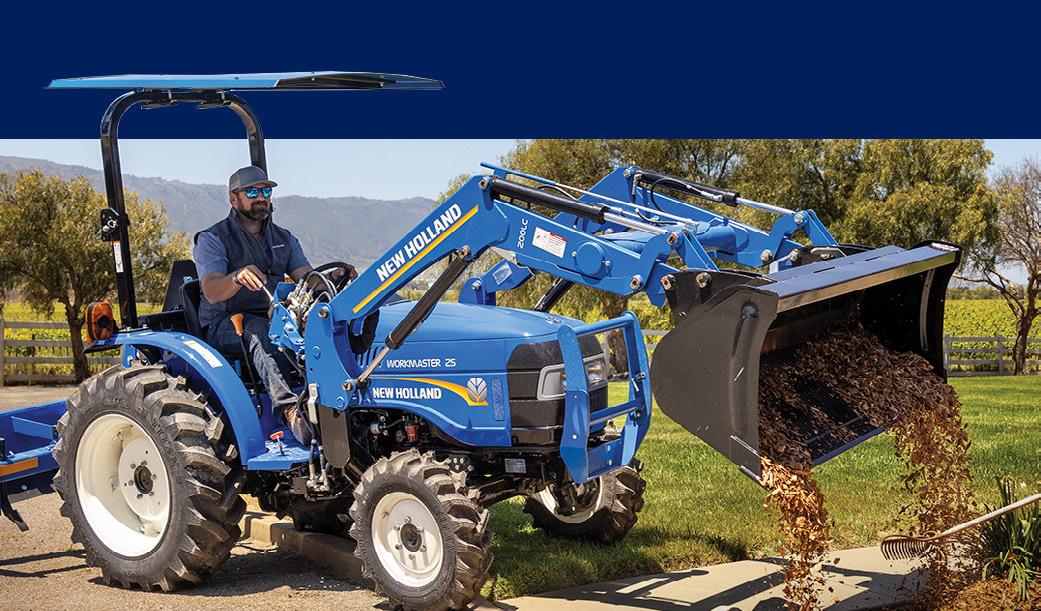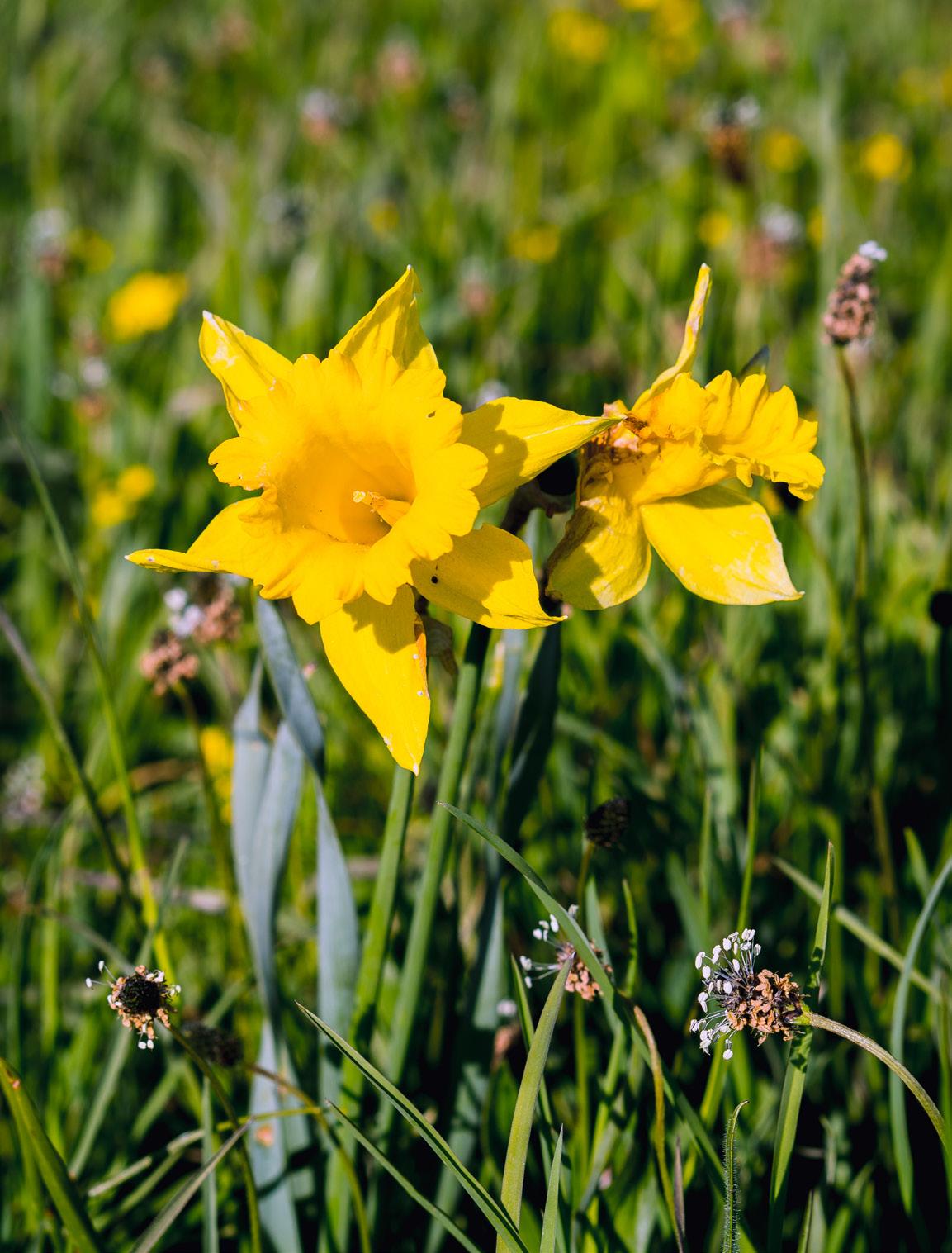

Future ISLAND FARM GARDEN&
ISLAND FARM GARDEN&
Publisher: Cowichan Green Community
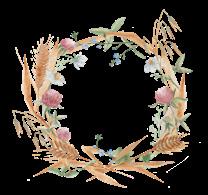
360 Duncan Street, Duncan, B.C. V9L 3W4
tel: 250.748.8506 cowichangreencommunity.org
Editor: Ian Locke | editor@cowichangreencommunity.org
Thanks to our "experts in the field" for sharing their wisdom
TABLE OF CONTENTS
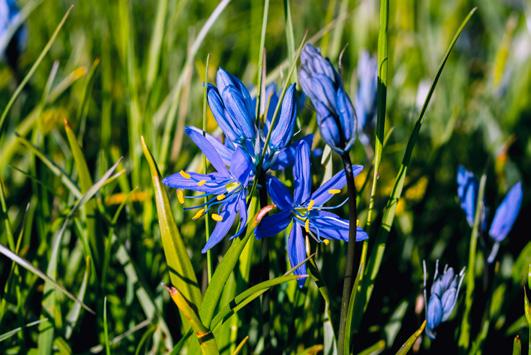
Many moons ago in 2018, I took on a job opportunity not at the Downtown Duncan Business Improvement Area Society, not knowing exactly what would be in store. Little did I know that it would be an incredible journey and learning experience on life in the Cowichan Valley, mid-island, and beyond.
Feeling out of my depth and steeped in imposter syndrome, I remember that previous Cowichan Green Community executive director Judy Stafford made an effort to make me feel welcome, especially when she offered me a blanket to sit on at a special event that lasted much longer than I thought it would during my first two weeks in the job.
Find
their agricultural needs.
Let our happy readers from all over the Island know about your business and enjoy our affordable rates.
Contact Arla Vander Voet by email personally at arlavv65@gmail.com or by calling 250-618-2522 to book your advertising
Fast forward to today, two jobs and a few global crises later, I found myself answering a call from Judy asking for help with Island Farm & Garden Magazine. My immediate answer was “yes” because I believe in the CGC's mission to support and grow local food systems in the Cowichan Valley, and on Vancouver Island.
In challenging times, globally, economically, environmentally, and politically, Vancouver Island is a paradise; we must understand the value of what we have at our fingertips. Having lived in multiple cities across the country, throughout my life, this is the place I think is the best place to live in Canada.
I




by Ian Locke, Editor Cover photo and above photo: Ian Locke
Building a LUSH Future
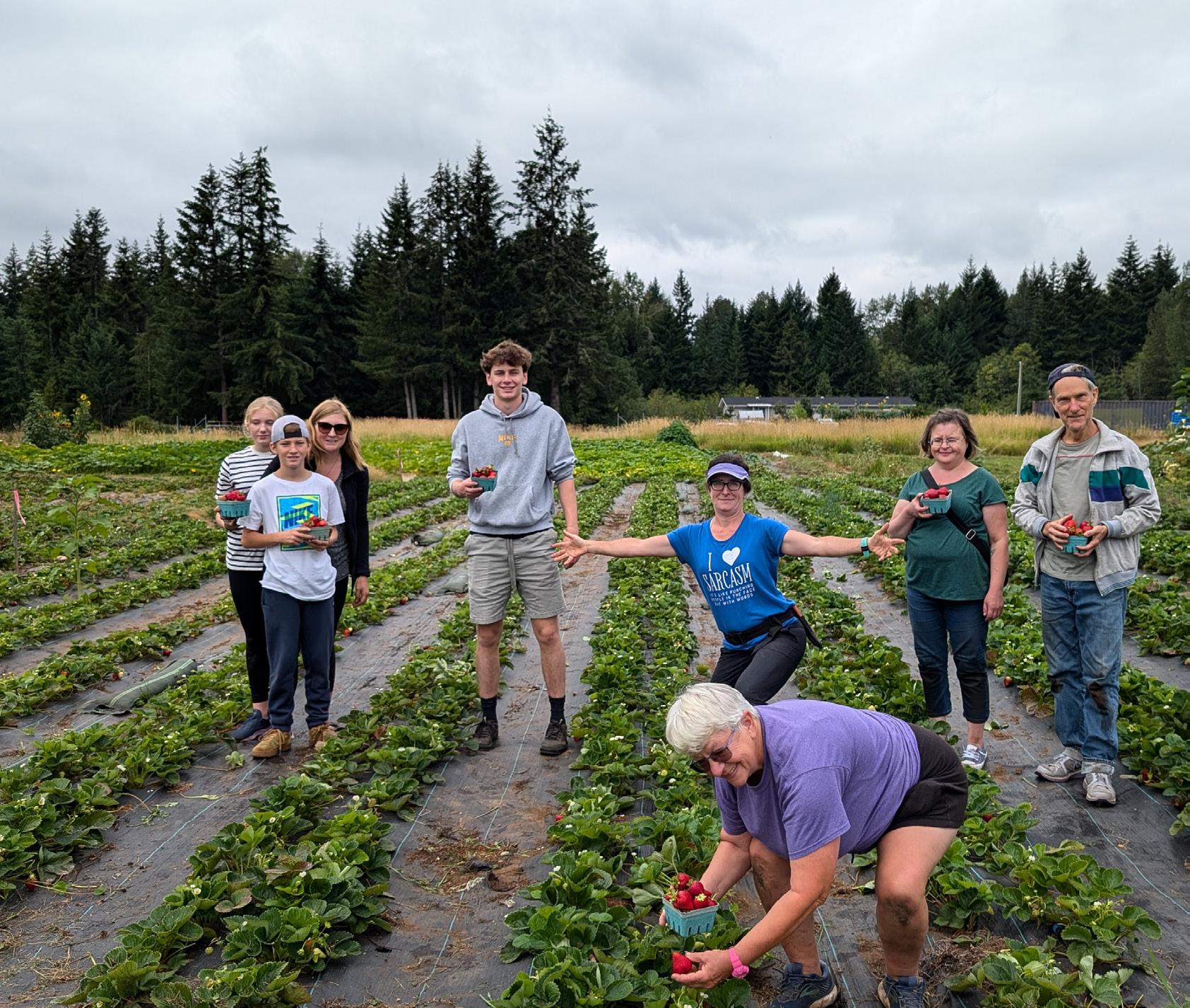






by Kristen Battle, photos supplied
eopolitics, trade wars, and climate instability have all complicated what was once a simple and satisfying part of daily life for many: buying groceries. During these challenging times, it's clear that the way forward is to buy local and support Vancouver Island farmers, producers, and processors. In response to the recent tariffs imposed on Canadian goods imported to the US, Canadian leadership has called on people to choose Canadian products when shopping and proposed retaliatory tariffs on imports of select American
inluding
LUSH Valley staff and volunteers glean strawberries at Fireweed Farm in exchange for weeding the strawberry patch.

In the short term, this will lead to higher grocery bills as distributors increase prices to offset the increased shipping and import costs. However, if the community comes together to support local farmers and producers now, Vancouver Island will experience the long-term positive benefits of building resilient local food systems. This includes maintaining access to fresh food in emergencies, reducing carbon equivalent emissions globally, and strengthening our local economy as money is re-invested in our communities, businesses, and organizations. A strong local food economy means local food prices are not vulnerable to larger supply chains and political interference, which can ultimately lead to local food being less expensive than global food in the future.
This hopeful future depends on the community's actions now.
In July of 2024, Kwantlen Polytechnic University (KPU) released a report analyzing B.C.'s Food Supply Chain, determining that "B.C. is currently 19 (min) - 34 per cent (max) selfreliant for food. The remaining 66-81 per cent of food consumption must be supplied from elsewhere". Additionally, LUSH Valley, in partnership with the Comox Valley Regional District, is currently undertaking a research project to identify North Vancouver Island's unique vulnerabilities and strengths when it comes to food flows. The takeaways from the KPU study and LUSH's initial findings are that B.C.'s food system is reliant on imports –and that, in an emergency, areas of Vancouver Island are vulnerable to being cut off from this "just in time" supply chain.



LUSH Valley staff and volunteers pose with over 700lbs of apples gleaned through the Fruit Tree Program. Fruit is distributed through LUSH Valley's food access programs including Good Food Boxes, Hot Meals and Healthy Student Meals.

People have the power to influence systems, and the community can work to localize and strengthen B.C.'s and Vancouver Island's food systems. While local farmers have the capacity to grow much more produce in our fertile region, they can only grow as much as they are realistically able to sell before expiration, and must plan their crops well ahead of each season. While changing the system takes time, consumers can work to ensure abundant local food well into the future by supporting local farmers, producers, and distributors today. A resilient, community-engaged food system supports everyone from producers, processors, distributors, chefs, restaurants, and eaters.
There are many easy ways to support the local food economy while staying budget-friendly and ensuring your meals are delicious and nourishing: to support local farmers, buy groceries from your local farmers' market, purchase directly from farms, or shop at locallyowned grocery stores. Watch for the Buy BC logo, which shows that a product is grown, processed, or produced in B.C.
In the Comox Valley, LUSH Valley envisions a region where healthy local food is at the heart of community well-being. LUSH takes a local food-systems approach to the complex issues we face. LUSH Valley purchases produce from over 30 Comox Valleylocal farms, looking to Vancouver Island- and B.C.-local goods when necessary, and distributes the farm-fresh, delicious produce through their Good Food Box Program. Additionally, LUSH runs a Hot Meal Program and Healthy Student Meal program for those in need in their region, utilizing local produce as the basis for these meals. LUSH Valley's Fruit Tree Program and Farm Gleaning Program rescue and redistribute thousands of pounds of food that would otherwise go to waste. Their Young Cooks, Community Kitchens and Community Garden programs teach valuable foodgrowing and cooking skills to hundreds of community members each year. To learn more about LUSH Valley and its various programs, visit www.lushvalley.org.
Next time you are about to make a purchase, consider the impact of your choice. By shopping locally, you're not just buying a product; you're investing in your community's future, building strong local relationships, and fostering a more resilient and connected community, safeguarding our future against the uncertainties of the global economy and climate change. Each small decision we make to buy local food has a ripple effect, ensuring that Vancouver Island remains vibrant and resilient. Show some local love today to build community for the future!




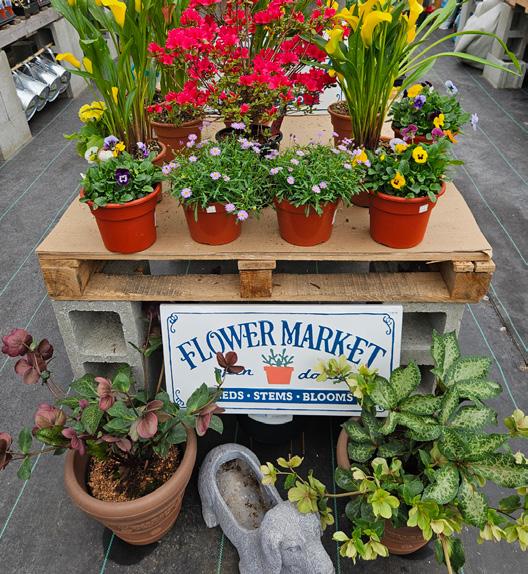

LUSH Valley's Warehouse Manager Katie Kennedy packs Good Food Boxes to be distributed to community members at low or no-cost.
Changes at CGC Garden Centre

Garden Centre Opens For The 2025 Season with Exciting New Changes
by Janice MacKirdy
As we welcome the 2025 season, Cowichan Green Community's (CGC) Garden Centre in Duncan is thrilled to unveil an expanded and enhanced selection of plants and products. This year, we're highlighting variety, sustainability, and community, promising an exciting and unique gardening experience. Our commitment to providing an exceptional gardening experience is reflected in several significant upgrades across the farm, all designed to enhance your gardening journey.
We are particularly excited to announce that we have tripled our production space, allowing us to offer even more variety,

including bedding plants, vibrant summer-blooming bulbs, and a broader selection of high-quality soil amendments for sale. Our new inventory will include organic, local fertilizers, perfect for cultivating a sustainable garden that nurtures plants and the environment.
We have also expanded our outdoor garden spaces. This season, one of our top priorities is completing another section of our front flower border, creating a stunning visual display for all to enjoy. We are also thrilled to announce the creation of a new medicinal plant garden. This demonstration garden will serve as a resource for seed collection, supporting our ongoing efforts to promote biodiversity, sustainability, and increased access to local herbal medicine.
The Garden Centre is located at 2431 Beverly Street in Duncan. Stop by to enjoy:
Our beloved Market Day on Thursdays, where we offer fresh farm




produce and artisanal farm goods from 9am-4pm.
The Plant Nursery, which will be open 9am-4pm for plant sales Tuesday to Saturday for the season.
As the season progresses, we will offer a variety of workshops designed to inspire gardeners of all levels.
Overall, 2025 is shaping up to be an exciting and successful year. We look forward to welcoming you back to the Garden Centre and sharing these remarkable changes! For more information, farmhub@cowichangreencommunity.org or 250-748-8506.

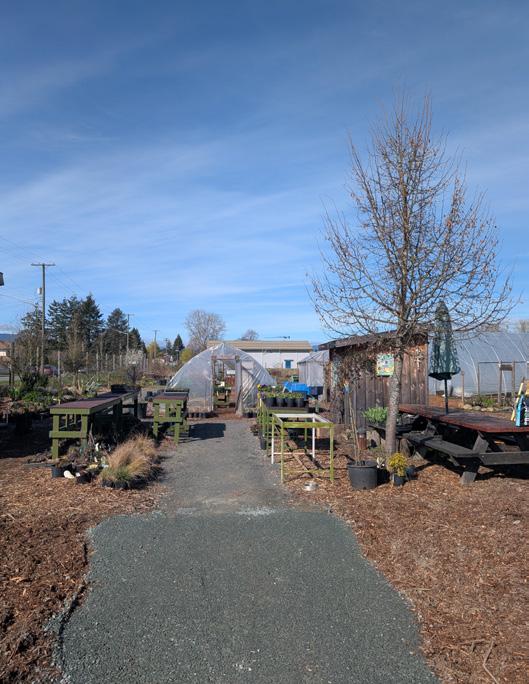

Home Grown
Vegetable Growing 101 - Spring 2025
by Beth Walrond
Growing your own food in these uncertain times makes so much sense. If you are an aspiring gardener, here's how to get started:
Seeds: You need viable seeds –that is fresh seeds. When buying seeds from garden centres, this will not be a problem. If you are not sure of your seed’s viability, test 10 seeds by putting them in a plastic bag on a wet paper towel. If they don’t sprout in a few days, compost them. See West Coast Seeds’ catalogue for a Seed Longevity chart.
Pay attention to the seed packages, as they contain a lot of useful information. Note the date you bought the seeds if the package isn’t dated.
Successive Planting: Plant a few seeds at a time, not the whole package. Think about how much you need to eat in a week. Every 2 to 3 weeks, plant more for a steady harvest throughout the growing season. We are so lucky on Vancouver Island with a long growing season of over 200 days. That means you can grow 3 crops a year. Note the number of days to harvest, which is listed on the seeds package.
Sunlight/Shade: Most vegetables need sunshine, 8 hours of full sun. Some need more, like onions, which require 12 (short day onions) to 16 (long day onions) hours per day. Some will grow in part shade. Knowing your crops’ exposure requirements will set you up for success.
Location: If you are in a house with a lawn and some flowering shrubs or trees, you are lucky. Convert part of the
lawn to raised beds. Try Lasagna Gardening for an easy method. To start, make a frame and bring in soil (i.e., a good mixture of sand, garden soil, and manure, Sea Soil, and/or compost). Locate the beds where they will get full sun and some light shade. Our West Coast summers are getting hotter, and the shade will be a blessing in July and August. Start out small and expand your garden as you gain experience.
What to grow? I don’t like cilantro, but I do like parsley, so that is what I grow. If you are a salad lover, then sow a variety of lettuces and other greens, like kale. Add some green onions, peppers, or tomatoes, and you will be ready to really enjoy your own homegrown summer salads.
Fertilizer: Most vegetables need a lot of it. As a Master Gardener, I spend time every growing season at public clinics answering gardeners’ questions. The most frequent knowledge gap I have observed is around fertilizing. Good organic products, like Gaia Green or Organique, are essential for the vegetable garden. Generally, apply every two weeks. Except for tomatoes, apply twice a week, as they are heavy feeders. Some vegetables are light feeders, some are givers, like peas and beans that fix nitrogen in the soil and some are heavy feeders.
Water: Water is another essential element for the garden. The use of soaker hoses laid on the ground in your vegetable beds will reduce about 70% of your water consumption compared to overhead sprinklers. One hour once a week is recommended -- until we get to the hottest part of the summer. Then twice a week may be necessary, but mulching over the hose will reduce evaporation and save on water, too.
2. A second container is for tomatoes and potatoes. Phoenix Perennials has a “Ketchup ‘n Fries” TomTato plant which will produce potatoes and tomatoes on one grafted plant. Choose smaller-sized plants suitable for containers. There are dwarf or mini versions of vegetables, which are great for small spaces and containers. Disease-resistant varieties will save you a lot of trouble.
3. For the third container, I recommend planting a few herbs. What are your favourites? Oregano, parsley, mint? Combine with Everbearing Strawberries, which can spill over the sides of your container. Herbs and small fruits are the most expensive foods to buy, and you can save a lot on your food bill when you harvest them at home. Gardening is so satisfying. There is much to learn, and there are many sources of information. Research and plan for best results. Look for Vancouver Island Master Gardeners at local nurseries and garden events this season. We love to answer questions.

Support your local farmers, buy their produce fresh from farm stands and at Farmer’s Markets. Between our local farmers and your new vegetable garden, you will be more secure in your food supply.
Resources/References: Vancouver Island Regional Library https://www.virl.bc.ca See Virtual Gardening Series which covers many topics given by Vancouver Island Master Gardeners.
https://westcoastseeds.com Get their catalogue or see it online as it contains valuable information in addition to the seeds, like a Disease Resistant Chart, Seed longevity chart, and PH requirements of plants.
What if you don’t live in a house with a yard? If you live in an apartment or townhouse with a balcony, then container gardening is the answer. I would suggest 3 containers, if space allows.
1. One for salad greens. The “Thriller, Spiller, Filler” concept that is used to plant flowers in containers can be applied to vegetable containers. The first container can be kale for the thriller in the middle. If you really want to make this look good, the purple Redbor kale will add a splash of colour. Grow Butter Crunch, Red Deer, and Drunken Woman lettuce for the filler and New Zealand Spinach for the spiller. This spinach is a perennial vine that is frost-resistant and heattolerant.
https://www.phoenixperennials.com/ https://www.vimga.org for lists of public clinics and other information about community gardening events.


Beth Walrond: B.A. Diploma Visual Arts, M.A. Gardening. Member of Vancouver Island Master Gardener’s Association.

Annie's Farm
A new farm in the Cowichan Region

John and Telia Hsieh are the new proud owners of Annie’s Family Farm located off Drinkwater Road in Duncan. They are passionate, grounded, and radiate community spirit! Annie’s Family Farm is also one of the new farms featured on this year’s 2025 CowichanGrown Farm Map, published annually by Cowichan Green Community in partnership with Economic Development Cowichan and Tourism Cowichan. Keep an eye out for your free map, or call 250-748-8506 to find out where you can grab a copy near you!
John and Telia didn’t grow up farming and consider themselves, “returning-generation farmers”. Throughout their farming journey, they have discovered more about how previous generations of their families were connected to farming.
John’s background is in IT, tech, and web development. He founded his own company in 2013. Over time he increasingly felt drawn to spend less time in front of screens and more time outdoors. When his company was acquired in 2019, it was the perfect opportunity for a significant career pivot, eventually leading to farming.
Telia spent ten years working in community support
roles, primarily at the Urban Native Youth Association in Vancouver. During this work, Telia would regularly visit the Tu’wusht garden at UBC Farm, witnessing the power of farming to ground, heal, and form community.
Their passion for farming ignited in 2014 when WWOOFing in Sardina, Italy, tending an orange orchard. The experience introduced them to a slower and more mindful lifestyle intimately connected to the land. Following this experience, Telia made several additional WWOOFing trips to Jollity Farm on Thetis Island where Noah, Elizabeth, and Finn generously shared their extensive farming knowledge and encouraged Telia to enroll in JM Fortier’s Market Gardener Institute, which they completed in 2021.
When looking for their future home, all signs pointed to Vancouver Island. John grew up in Vancouver, while Telia grew up in Metchosin and moved to Vancouver later. After John’s mother’s passing in 2020, they felt it was important to be closer to family. Both have family on the Island. They conducted extensive research on various climates and determined that the Island was a great fit.
After settling in Nanaimo and exploring the Island on weekends, it was a stroke of luck that they found the perfect farm. The property had been thoughtfully cultivated by Kailli and Zack of Dancing Dandelion Farms, and before that Glen and Joy of Trees Plus. Both operations were well-known and deeply valued within the community, and John and Telia are committed to continuing that legacy and expressed gratitude to John’s sister, Ella, who helped support them in the farm purchase.
The name for Annie’s Family Farm is a tribute to John’s late mother, Anne Sharp, who passed away in 2020. Anne was the primary caregiver, making enormous sacrifices to ensure her children had everything they needed. She taught John invaluable lessons about kindness, independence, generosity, and good business practices. John attributes all his best qualities to Anne and continues to hear her wisdom and warmth echo in his mind every day. Telia lived with John and Anne for four years, some of the happiest in both their lives. Annie’s Family Farm represents their heartfelt commitment to keeping Anne’s spirit alive and continuing her legacy of love, community, and care. She would be incredibly proud and
excited about what’s happening on the farm today. John and Telia have a vision to become a community staple, providing fresh local produce and eggs to the community and even plan to explore unique agri-tourism experiences to allow visitors to connect with farm life. Telia grew up experiencing limited access to Asian Groceries on the Island and plans to dedicate a portion of their crops to growing diverse Asian Vegetables for the community and local restaurants.
Veggie facts! John’s favourite vegetable is cabbage. Shredded paper-thin, it adds a subtle sweet crunch that’s delicious on almost any dish! Telia loves a good tomato as they are so versatile! Tóng hāo (Chrysanthemum greens) is another favourite that they plan to grow. It has a fresh mildly herbal flavour with gentle floral undertones and a subtle bitterness similar to endive.
These two are excited and humbled to join the farmers, growers, and producers in the Cowichan Valley and feel incredibly fortunate and eager to learn from this community. To follow along with their journey, sign up for their newsletter at www.anniesfamilyfarm.com, or find them on Instagram and Facebook. Reach out with any ideas or requests about what you’d like to see offered at info@ anniesfamilyfarm.com Welcome to the Island farming scene! We are lucky to have you both!








When their landlords unexpectedly cut down blackberries lining the yard around this time, the two were determined to transform their unsightly ivy and blackberry stump-filled yard. They spent countless hours clearing the roots out and created their first full vegetable garden. Dreaming of their future farm, they filled the garden and expanded the following year. The ability to grow and share an abundance of wonderful food with friends, neighbours, and coworkers officially had them hooked!








by Naomi Kulhawy, photo supplied
Overwhelm to "Garden Whelm":
Skills to help you grow food

Being stuck in a sensation of being totally overwhelmed can shut down our abilities to care for our gardens and it’s possible to dance our garden boots right on through overwhelm into a groovy gardening zone. As the light shines brighter these days on the value of growing local food, people are becoming inspired to start gathering up fresh efforts to figure out how to incorporate gardening into their lives. Gardening holds so much potential for people and with a few skills around coping with feeling overwhelmed, we can access a world of edible possibilities. Side by side with the pollinators and birds we can find a place where we are ‘whelmed’, flowing with the connection to plants and creating healthy surges of energy in ourselves and abundance on the land. Ok, we are overwhelmed,
standing at the gateway to our growing spaces, peering around in a haze of sometimes, downright despair at what we wish could be there, but isn’t happening. It’s now time to simply start with gratitude, we can find something we are thankful for on the land and move from that grounding thought into perhaps 15 minutes of tidying up some overgrown pots and reminding ourselves why we love growing food. Having a few new veggie starts can be a great motivator for preparing the garden, enabling oneself to hold some hope and excitement while moving through difficult tasks. Play some music to accompany you, or ask a friend to be a garden buddy, swapping work party sessions in one another’s gardens. Using time chunking strategies, with 15-30 minutes here and there paired with a cup of tea can be just the action
a sense of having learned our boundaries around what is just too much garden to take care of. High five a garden buddy for making smart choices and carry on with focusing on growing your favourite foods.
the food they chose to grow being related to a sweet childhood memory and that these are the plants they have the most success with.
it takes to lift our spirits and enact our caretaker's instinct for the earth. Our contact with Mycobacterium vaccae in the soil triggers the release of serotonin in our brains, therefore we will be naturally rewarded for just getting past the overwhelm to access gifts from the soil.
Once we are back in our garden boots or hopping about in bare feet on the land again, we can begin to explore the nuts and bolts of how our overwhelm built up in us, like perhaps we have too many garden beds? It’s honestly not a bad experience to close an area of your garden to reduce the amount of unyielding weedy spaces - cover it with cardboard & woodchips and save it for another season. It’s a way to respect yourself and it could be glorious when approached with self-compassion and
Choosing what to plant can easily turn into incapacitating overwhelm, when too many options and the factors involved in decision making become too much to cope with. Good advice is to choose plants that have the following qualities: a favourite food; a lovely historical connection with you; suits the level of sun you can provide; is more affordable to grow than buy; is part of the ingredients of a preserve you love to make; and there are several others, but these are great ideas to start with. One might choose raspberries because a friend can dig up the runner plants to donate to you, plus it's expensive to buy berries. Garlic could be chosen because you don’t have deer fencing and you want to save money while improving your immune system. Having an herb garden is a great way for new gardeners to get started, and they also tend to support several pollinators with the flowers from chives, parsley, fennel, thyme, sage, rosemary, and lavenders. Treat yourself to fresh basil in the summer and if you have lots of warmth, there's something special about fresh strawberries. If you are looking for minimal maintenance, choose perennials such as asparagus, berry bushes, and self-seeders like calendula for flowers. If kids are involved, then growing peas, strawberries, cherry tomatoes, cucumbers, pumpkins, and corn can be especially fun. Oftentimes gardeners will have stories about
Providing access for kids to experience growing food can really help them when they are older as they will naturally connect with plants they loved to grow and eat in their childhood. Most adults are overwhelmed just at the thought of all there is to learn about growing food. Now imagine how many more people would grow food if they had learned how to in school - and how many more teachers would share garden knowledge if they’d been taught it in school as well! Much work is needed to advocate for and enact growing food in schools from both the district and provincial levels because as it stands there is very little support, despite all curriculum goals being able to connect to gardening (science! etc). Thankfully, there are organizations helping enhance community knowledge on growing food, such as Farm To School BC and Cowichan Green Community, who provide workshops, resources, and volunteer opportunities.
If you are looking for advice or even to hire a gardener, don't be afraid to ask. There's still time to take on food or pollinator habitat garden designs and installation plans this season. Inspiration is just around the corner waiting to be discovered. If you have any questions please feel free to contact me at: info@ cowichanrecyclists.com

by Erin Ward, Cowichan Recyclists, photo supplied
Strengthening Local Food, Cooperatively.
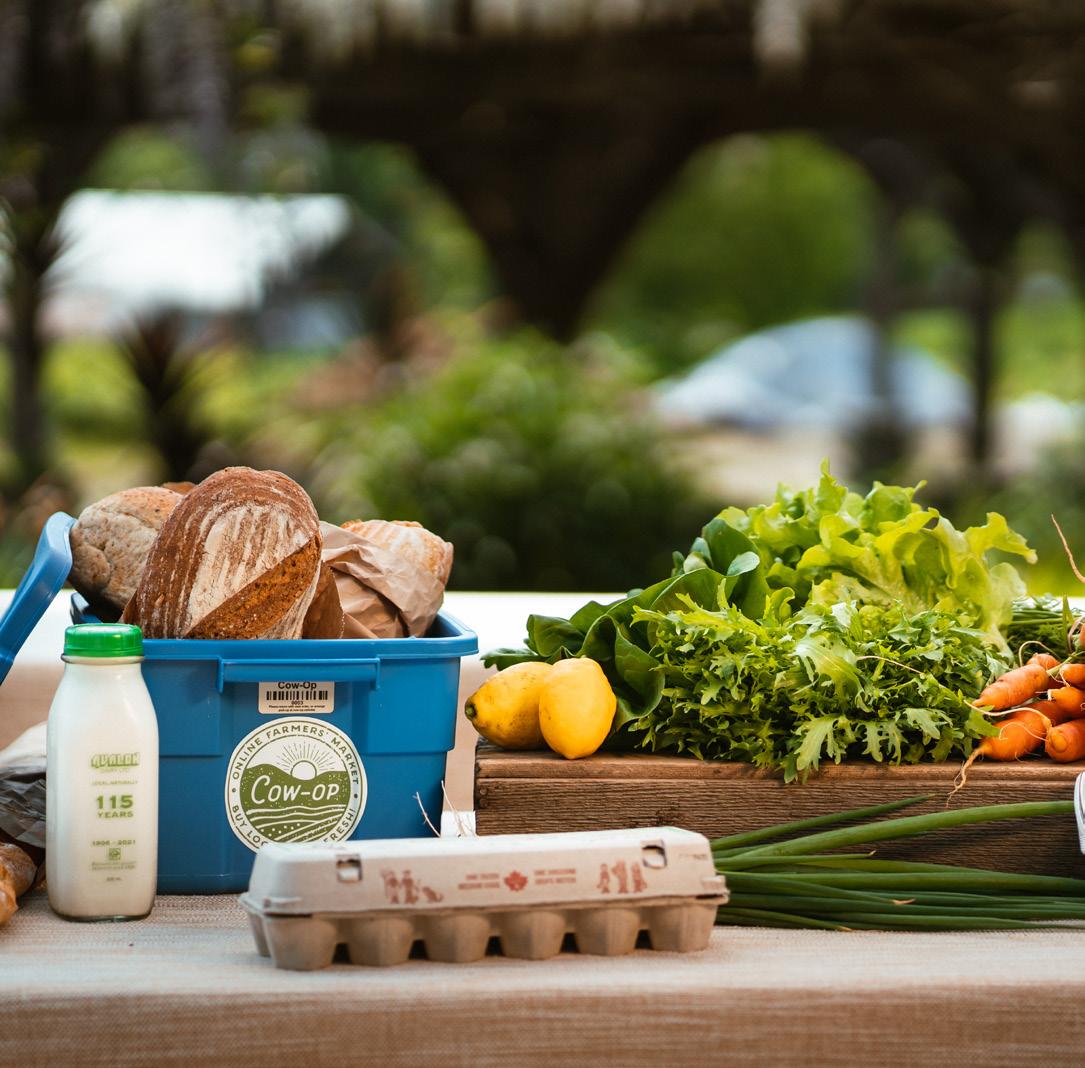
By
Tamra Nash, Cow-op Marketing Ambassador & local food enthusiast, photo supplied
Cowichan Valley Online Farmers Market (Cowop), a cooperative of farmers and food producers, is dedicated to strengthening our regional food system in the Cowichan Valley. By making locally grown, raised, and crafted food easily accessible to consumers, Cow-op ensures that the community can rely on a stable food source even during times of uncertainty. For local food producers and processors, Cow-op is more than
international trade tensions affect food availability and affordability, the need for a more self-reliant food system has never been clearer. That’s where organizations like Cow-op play a crucial role.
Why Local Food Matters Now More Than Ever
The benefits of a strong local food system go far beyond economics. Locally produced food is fresher, more nutritious, and has a smaller environmental footprint than imported goods. When food travels shorter distances, it maintains its quality while reducing greenhouse gas emissions associated with long-haul transportation.
Moreover, a thriving local food economy promotes food security. By investing in our own food production, we are less vulnerable to external shocks, whether they be trade disputes, extreme weather events, or global pandemics. Vancouver Island’s unique geography already presents challenges for food importation, making regional food resilience even more vital.
A Community Effort
Consumers play a key role in supporting local food systems. Every purchase from a local farmer, fisher, or artisan contributes to a more sustainable and secure future for our region. Choosing to buy from Cowop or at farmers’ markets, subscribing to a local CSA (Community Supported Agriculture) program, or dining at restaurants that prioritize local ingredients are all meaningful ways to support Vancouver Island’s food producers.
Despite the uncertainties of the world, one thing remains certain: investing in local food strengthens our community. With organizations like Cow-op leading the way, Vancouver Island is well-positioned to build a resilient, sustainable, and delicious future. Now is the time to embrace the power of local food and ensure that our region thrives, no matter what challenges lie ahead.
How Cow-op Supports Local Farmers and Consumers
Cow-op’s mission is to create a strong, resilient food system by directly connecting local farmers and food producers with consumers who value fresh, sustainable, and ethically produced food. As a producer-owned cooperative, Cow-op provides a streamlined online marketplace, Cow-op.ca, where customers can conveniently shop online for a wide range of locally grown and made products. Farmers benefit from fair pricing, a reliable sales channel, and reduced marketing burdens, allowing them to focus on what they do best—growing high-quality food. Customers, in turn, enjoy easy access to fresh, seasonal, and locally crafted goods, knowing their purchases directly support Vancouver Island’s food producers. By choosing Cow-op, consumers become active participants in strengthening our regional food economy while enjoying the best our local farms and artisans have to offer. Hungry for more? Visit Cow-op.ca to learn more and get started today.

just a marketplace—it’s a partner in growth. Through its online platform (Cow-op.ca) and distribution network, Cow-op connects small-scale farmers and food businesses directly with consumers, restaurants, and retailers. This support provides farmers a steady and reliable sales channel, reducing their dependence on unpredictable global supply chains. It also helps to keep dollars circulating within the local economy, creating jobs and fostering a vibrant food culture.
In the Cowichan Valley, local farmers and food producers work hard to provide fresh, nutritious, and high-quality goods to our communities. Yet, as supply chain disruptions, inflation, and
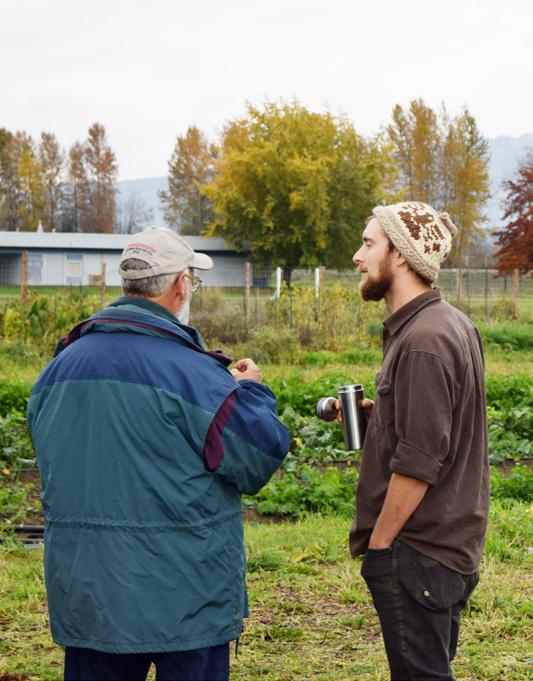
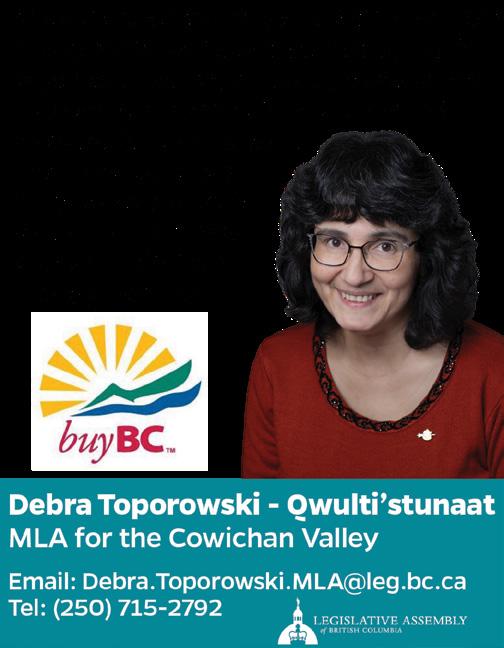
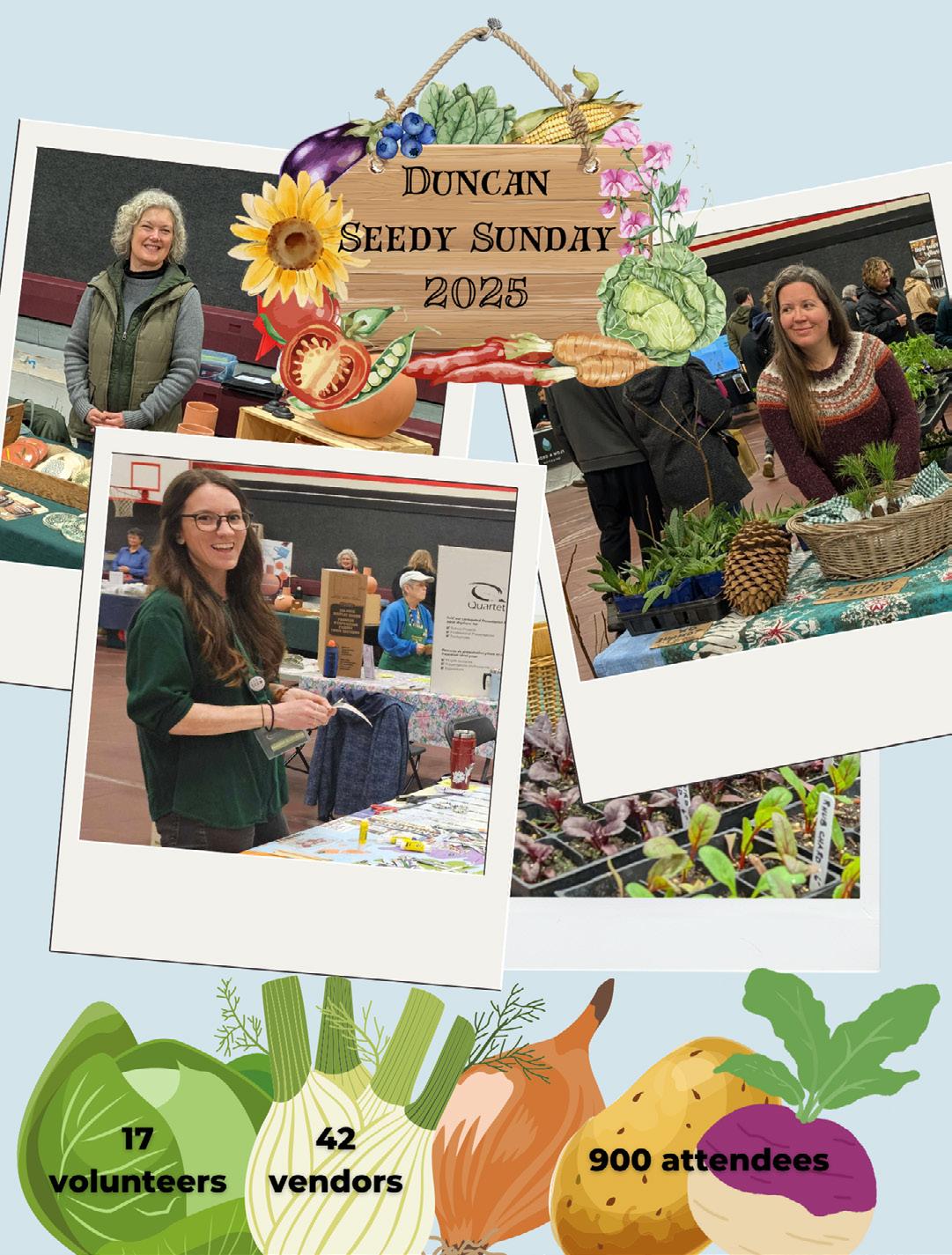
Duncan
By Lauren Bosch
OSunday: A Resounding Success
n March 23, 2025, the Cowichan Valley's gardening community, with over 900 attendees, gathered at the Si'em Lelum Gymnasium in Duncan for the 16th annual Duncan Seedy Sunday. Hosted by the Cowichan Green Community (CGC), this year's event was a great success despite the rain!
Attendees were greeted by diverse offerings, from locally produced seeds to vegetable seedlings, herbs, native plants, and garden accessories. Whether seasoned gardeners or novices taking their first steps into cultivation, there was something for everyone. A community seed swap further enriched the experience, fostering a spirit of sharing and sustainability. Beyond local vendors, the event offered a wide array of activities, including a seed exchange, kids' activities, live music, food trucks, and knowledgeable presenters, ensuring that everyone, regardless of their gardening experience, could find something of interest!
The success of the 2025 Duncan Seedy Sunday underscores the Cowichan Valley's commitment to sustainability, community engagement, and the celebration of our local agriculture. As attendees left with seeds and plants in hand, ready to embrace the planting season, the event highlighted the importance of sharing knowledge, resources, and a collective passion for gardening, making us all proud and connected to our community.
Looking more broadly, the success of the Duncan Seedy Sunday and the hundreds of similar Seedy events that occur across the country every spring stand as a reminder of the profound impact that individuals and communities can have in shaping the food system they want and need.

As a side note, Seedy Sunday in Nanaimo in March was also a succuesss as pictured below and continued on next page.
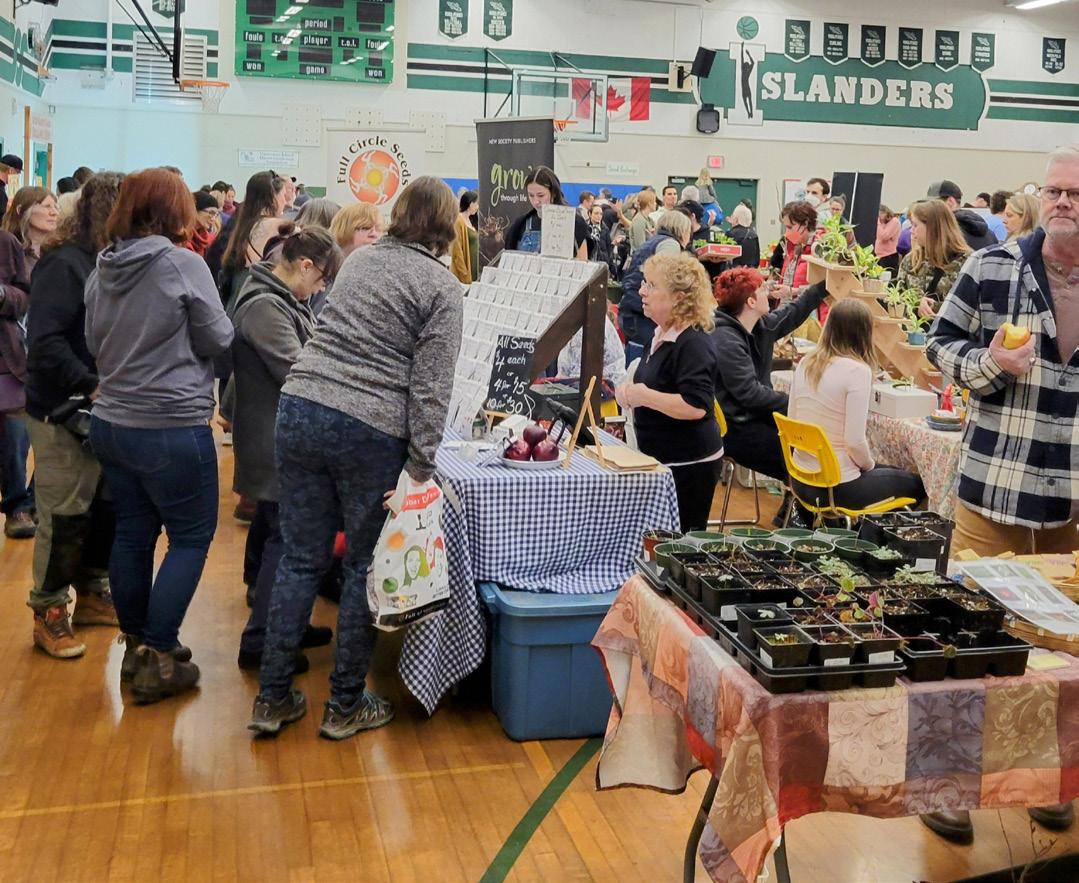
Seedy
Seedy Sunday Nanaimo



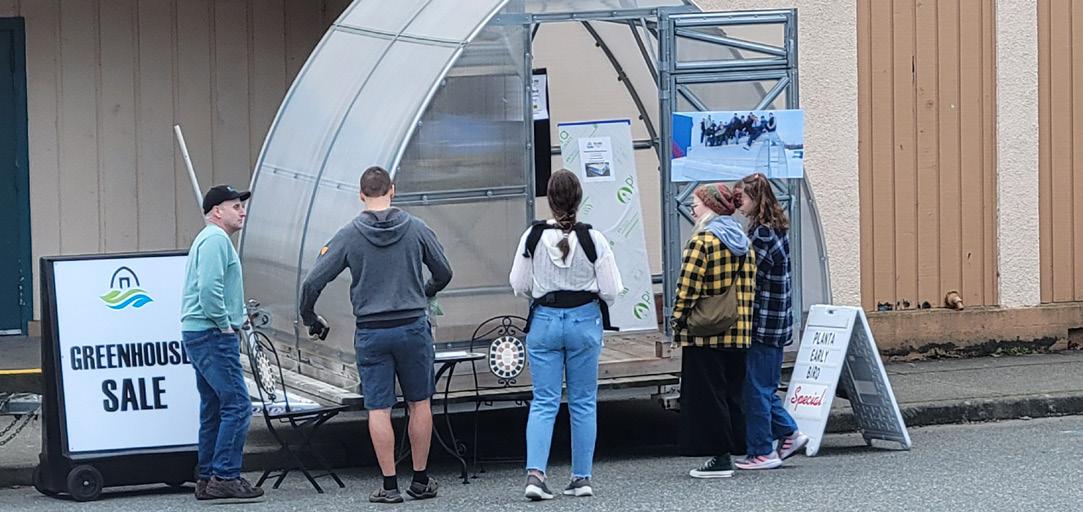
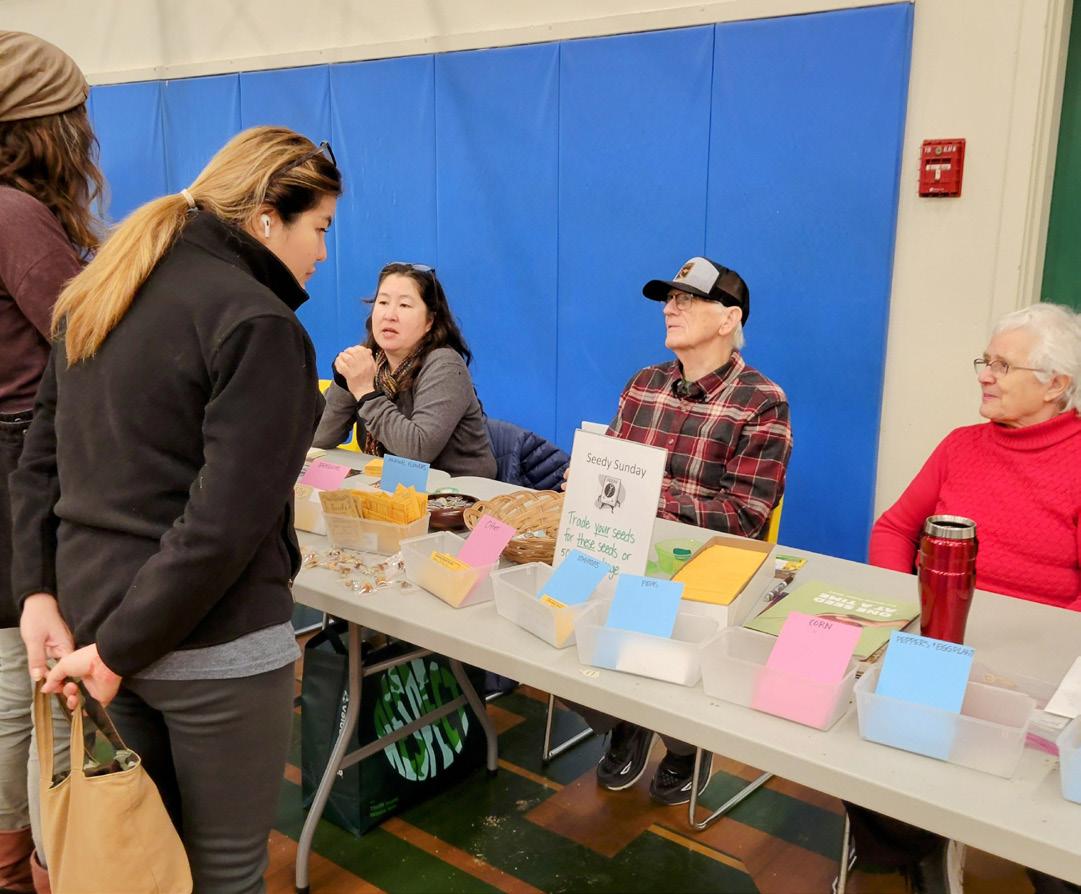
photos: Arla Vander Voet
Water to Earth The importance of Raingardens


What is a rain garden?
Arain garden is a specifically designed landscaping feature that helps manage rainwater run-off (sometimes referred to as stormwater) from roofs, driveways, sidewalks and, other impermeable surfaces. During a storm, rainwater is slowed, captured and, filtered into the soils of a rain garden, drain, lake or stream. Rain gardens work when they mimic the hydrological cycle, where water is cleansed of pollutants as it seeps into the ground to replenish the water table. They can be built and, maintained at many sizes. Local governments, organizations, businesses and, households can contribute to water sustainability by planting and supporting rain gardens.
A rain garden is a shallow depression in the ground filled with native plants, shrubs and, trees that is strategically placed to capture and allow rainwater to slowly soak into the soil like the one pictured to the left at the RDN Administration Building at 6300 Hammond Bay Road in Nanaimo.
The Regional District of Nanaimo’s (RDN) administration building is home to a recently upgraded rain garden. The RDN’s rain garden was re-established in 2024 so that it functions to slow, capture, and filter stormwater run-off from the surrounding landscape, parking lots, and roadways. The existing rain garden was improved by removing turf and invasive plants, installing fresh soils and, mulches and establishing native plants throughout the site.
A Goal of the RDN’s rain garden project is to create a demonstration site to raise public awareness about rain gardens and, green infrastructure. This project supports the RDN’s Regional Strategy for Rainwater Management, a collaborative plan with municipalities across the region.
City of Nanaimo Rain Gardens
There are a variety of rain gardens located in the City of Nanaimo. Green infrastructure considerations are part of many new projects within the city, so expect to see more rain gardens popping up around town. Here's a list of rain gardens you can visit in the City of Nanaimo:
• Quality Foods on Bruce Street in Harewood
• Hawthorne Neighbourhood
• Firehall #1 Downtown Nanaimo
• Westwood Lake (Opening May 2025)
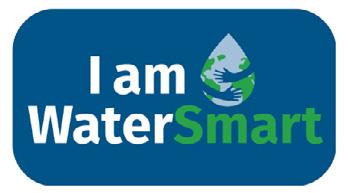

Green Rock Industrial Park, Boxwood Road, Nanaimo Green Rock Industrial Park (pictured above) is located at Boxwood Road and Dufferin Crescent in Central Nanaimo. It was completed in 2023, and at the time, was the first "green" subdivision on Vancouver Island. It has 23 acres of land that is unique in its use of bio-swale rainwater management systems and, the retention and planting of natural vegetation that will be maintained through automated irrigation only until a root system is established.
Memorial Drive, Qualicum Beach
This rain garden (below) cleanses the rainwater run-off from the commercial core through stormwater drains while providing an attractive lift to the main gateway to Qualicum Beach. It serves the community by reducing flooding and stream erosion, supports summer stream flows and minimizes water pollution.

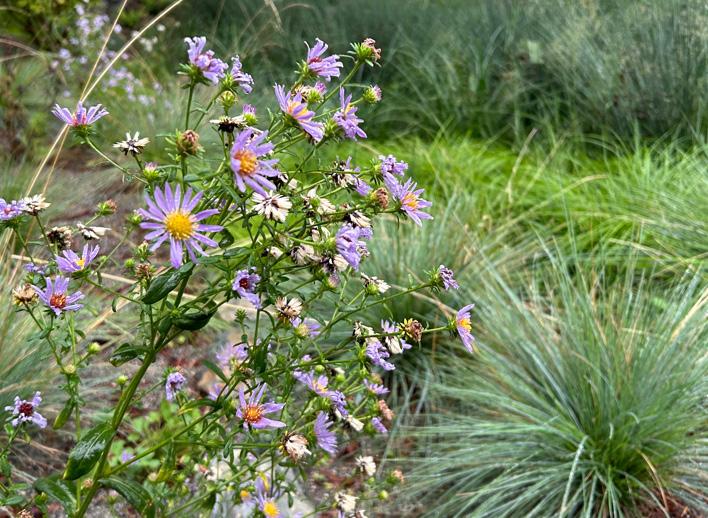

Food Security during challenging times
We are also supporting innovation in farming through the BC Centre for Agritech Innovation. Nineteen new projects will bolster our agriculture industry by helping companies scale up their technology and deliver more training opportunities, while creating nearly 200 new jobs. Hundreds more people trained in science and technology will soon be hard at work to enhance food security and strengthen the provincial economy.
We all want people to have access to nutritious food, so on top of hundreds of other projects, my ministry has funded new critical infrastructure that helps people access fresh food in the North Okanagan and throughout B.C. To help families who are struggling with food security, the provincially funded Critical Food Infrastructure Fund, administered by United Way British Columbia, is distributing $14 million over three years. These grants support food banks and other local organizations that redistribute food to people in need, helping with the cost of storage spaces, refrigerated vehicles, and equipment for food processing.
Last month, the Premier’s task force on agriculture and food economy was created to ensure our food supply and food economy continue to grow despite U.S. tariff uncertainty. Members will work hard to maintain British Columbian’s access to affordable and healthy food and offer the government first-hand knowledge of how to respond to these challenging economic times.
These are just some of the actions we are taking to tackle food security issues caused by inflation, climate emergencies, supply-chain disruptions, and unjustified tariffs. British Columbians have also been stepping up with remarkable efforts to Buy BC and Buy Canadian. I am so proud of how our community and our province are responding to this challenge.
If you have any questions or concerns about a provincial issue, or need assistance with a provincial body, please don’t hesitate to reach out. We’re here to help.
With thanks,
Sheila Malcolmson, MLA
This raingarden was built by the Mid-Vancouver Island Habitat Enhancement Society (MVIHES) and the City of Parksville in 2012 and was planted with native vegetation. Over the following eight years, it became unsightly and was unrecognizable as a raingarden. In 2020 and 2021, MVIHES volunteers worked to cut back the vegetation to take this raingarden back to its more “manicured” state. Volunteers continue to maintain this site as it continues to filter pollution, protecting nearby streams.
Visit one or more raingardens featured in this article and enter to win at: getinvolved.rdn.ca/team-watersmart

This project was made possible by the Town of Qualicum Beach, the Pacific Salmon Foundation, TD Friends of the Environment, MVIHES and volunteers from Qualicum Beach Streamkeepers and Kwualikum Secondary students.
The purpose of the raingarden is to absorb rainwater run-off from impervious surfaces (roofs, roadways, sidewalks, and even compacted lawns). Minimizing the amount of water entering the sewer or streams directly. In this case, stormwater in the Beach Creek area soaks into the ground reducing surface water, reducing erosion, flooding and protecting nearby streams through filtration.

Dear Community Member,
British Columbia is a wonderful place to live, but many people are facing big challenges that place a strain on their budgets. Rising grocery bills have been top of mind for many of us. Food security has only become even more critical as we face unjustified tariffs from our neighbour to the south. Our government is putting people first by taking action to ease the pressures of rising costs, while strengthening our own industries to counter the negative impacts of the trade war.
This week (April 4th), we announced new financial support for food manufacturing that will strengthen the economy, create jobs, and improve food security. The Province is contributing $6.6 million so that B.C. companies can remain competitive by scaling up and adding new product lines while creating more than 165 jobs. British Columbians want to buy delicious food that is grown and produced right here at home, and we’re making sure more options are available.
Helpful resources:
• Visit the BC Benefits Connector at gov.bc.ca/BCBenefitsConnector to find benefits and savings for things like energy bills, transportation, education and training, and health care.
• Stay up to date with weather conditions and forecasts: Weather.gc.ca
• Find mental health and substance-use supports: Helpstartshere.gov.bc.ca
• The United Way BC 211 Racist Incident Helpline is available by dialing (toll-free) 1 833 457-5463 (1 833 HLP-LINE). Learn more at https://racistincidenthelpline. ca/

Sheila Malcomson: MLA
Nanaimo/Gabriola Island
Email:Sheila.Malcolmson.MLA@
leg.bc.ca
Tel: 236-362-0012
Fax: 250-714-0859
(Above) Native plants thriving in the RDN raingarden Parksville Fire Rescue, 160 Jensen Street, Parksville
Kwalicum Secondary School, Qualicum Beach
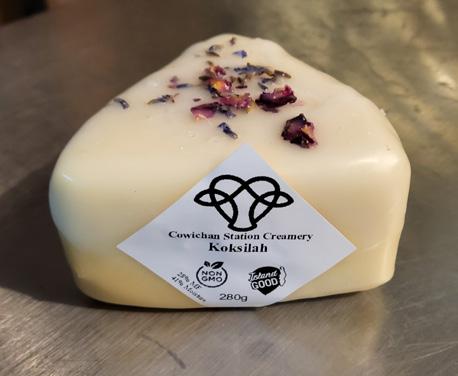

Beyond the logo, Island Good connects consumers with the stories behind their food, fostering a deeper appreciation for the effort and passion that goes into every product.
Island Good is committed to strengthening community connections, increasing brand recognition, and supporting environmentally friendly practices and reducing reliance on external supply chains to build a more resilient local economy
Community and Collaboration
The value of Island Good, why it matters.
by Diana Jolly, Project Administrator, Island Good photos supplied
These days , the world feels a little uncertain— especially when it comes to food. Prices keep changing, tariffs are on the horizon, and supply chains may get disrupted. That's why choosing local is more important than ever, and Island Good is here to help.
Choosing Island Good means:
Keeping Money in the Community - Every dollar spent on Island Good products helps support local farmers, producers, and businesses.
Better, Fresher Food - Local products don't have to travel far, which means they're fresher, tastier, and often healthier.
A Stronger, More Resilient Food System - The more we rely on Island grown, raised and produced food, the less we depend on unpredictable global supply chains.
What is Island Good?
The Island Good logo helps shoppers easily spot local goods while giving Island producers the recognition they deserve.
Local food is more than just a meal—it's a connection to this incredible place we call home and to the passionate people behind every product. There is something special about knowing where your food comes from. It just feels good—Island Good! Take Cowichan Creamery, for example: their cheese comes from milk produced by cows grazing on grass grown right on their farm. If you're not following them on social media, you're missing out on adorable videos of their cows. As they say, "Kindness just makes it taste better."
Many local food producers also support other Island growers, producers and communities. Here are just a few examples:
• Arbutus Foods (Duncan) Contributes to local charities, recycles packaging, and donates goods to community organizations
• Duncan Garage Café & Bakery (Duncan) serves delicious baked goods and meals made from local ingredients while providing a welcoming community space.
• Natural Pastures Cheese Company (Courtenay) produces award-winning artisan cheeses from local milk, partnering with farms like Coleman Meadows for grass-fed water buffalo milk.
• Nikkei Ramen-ya (Courtenay) Makes Ramen building blocks and Ramen kits from scratch and provides a living wage for all their employees.
• St. Jean's Cannery & Smokehouse (Nanaimo) has been perfecting West Coast seafood since 1961. Now owned by the Nuu-chah-nulth Tribal Council, they continue the family tradition while staying ahead of the tide.
• The Cure Hot Sauce (Comox Valley) collaborates with local farms to source spices, vegetables, and herbs for their bold, flavourful hot sauces.
• Tree Island Yogurt (Cumberland) sources milk from local dairy farmers like Birkdale Farm in Comox for their gourmet yogurt. Their long-standing partnership with the Comox Valley Food Bank now includes a home delivery program for those unable to visit in person.
Overcoming Challenges, Together
Despite its many benefits, local food production comes with challenges. Island-based producers face higher production costs, supply chain issues, lack of processing facilities, and other hurdles. However, these obstacles have spurred innovation and
collaboration.
For example, Vancouver Island Farm Products in Comox is a collective of Island farmers pooling resources to supply fresh, locally grown produce. From leafy greens to sweet bell peppers, their growers cultivate a diverse range of crops. With a pick, pack, and ship turnaround of just 24 hours, they maintain peak freshness and unmatched flavour.
Similarly, the Island Vegetable Co-op Association (IVCA), based in Saanichton, is one of the oldest agricultural cooperatives in BC, established in 1952. IVCA is always exploring innovative approaches to improve collaboration between growers, agencies, governing bodies, wholesalers, and retailers. Their goal is to make farming a profitable, sustainable industry for current and future generations.
To address the challenges of limited processing facilities and high production costs, The Dock+ (part of the BC Food Hub Network) in Port Alberni offers a shared 17,000 sq ft. space with a commercial kitchen. Island Good businesses like Sutra Sauce, Forest for Dinner and Tofino Hot Sauce Co. use this facility to process their delicious goods.
Through cooperation and creative solutions, Vancouver Island and rural island producers are building a stronger, more resilient local food system that supports farmers, businesses, and communities alike.
Choose Island Good, Create Impact
Supporting local food is more than just a feel-good choice. Every purchase strengthens our communities, boosts our economy and supports a healthier environment.
Next time you shop, consider choosing local. Whether it's handcrafted jam from That's My Jam, a refreshing cider from Sea Cider Farm & Ciderhouse, or chips from Taco Revolution, your choice makes a real impact. The Island Good brand is more than a label—it's a commitment to keeping our communities strong and our food sources secure.
Together, we can continue to support local food, build community connections, and ensure that the rich flavours of Vancouver Island and the rural islands remain a celebrated part of our lives. Look for the Island Good logo and taste the difference of choosing local!
Island Good is an initiative of the Vancouver Island Economic Alliance (VIEA), a non-profit, non-governmental organization dedicated to fostering a thriving, sustainable, and self-reliant economy for Vancouver Island and the rural islands.
Island Good is a place brand to help shoppers easily identify local products (Vancouver Island and the rural islands). Look for the Island Good logo on products and in stores across Vancouver Island.Learn more at www.islandgood.ca
4-H FARM FROLICS



4-H is an organization dedicated to young people. The purpose of the 4-H program is to prepare girls and boys for their future as adult citizens. 4-H stands for head, heart, hands and health.
4-H British Columbia inspires and educates, builds awareness of agriculture and food production, and develop skills to help youth reach their full potential. It’s easy to become a part of 4-H by joining one of the existing clubs on the Island or by starting your own club; you can be a member or a leader of 4-H wherever you live. Members are between the ages of 6 and 21 and leaders are 22 years or older.
For a list of chapters visit: www.4hbc.ca/clubs/vancouver-island



M AK E TH E MOS T OF YOUR LAND
Take your tractor’s productivity to the next level this season.
Designed for challenging terrain, the Yanmar SA425 tractor has greater ground clearance and provides a rugged, stable platform for the work you need to do.
Powered by our famously reliable Yanmar three-cylinder diesel engine, the SA425 delivers a unique combination of power and fuel efficiency. And the operator platform was designed with you in mind: It’s easy to climb on and off. The seat is comfortable, and every instrument and control is at your fingertips.
YANMAR TRACTOR MODELS

SA Series 21- & 24-HP • YT2 Series 35 HP ROPS & cab • YT3 Series 47 & 59 HP ROPS & cab • YM Series 41,46 & 59 HP ROPS

